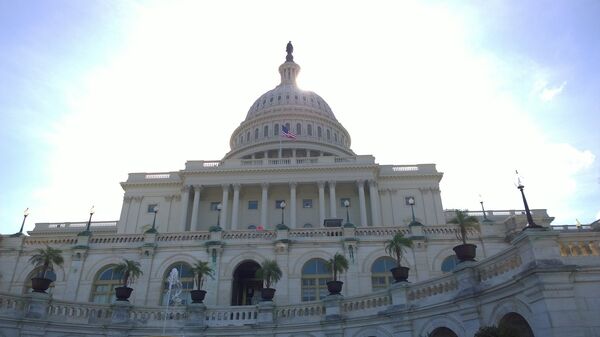Russia's Foreign Ministry has slammed US plans to slap new sanctions on Moscow, accusing American lawmakers of Russophobia.
In a statement on Friday, the ministry described the proposed sanctions as a "manifestation of Russophobic instincts" that reflect "powerlessness" and urged politicians in Washington, DC to think again whether to go ahead with "senseless" sanctions that "harm its own voters".
It comes after the House of Representatives approved an amendment to the 2020 draft defence budget, which provides for sanctions on investment in Russia’s sovereign debt over alleged election meddling.
The amendment has yet to become a law, since the defence spending measure must be okayed by both chambers of Congress and signed (or vetoed) by President Donald Trump.
The White House has objected to a number of provisions in the $733 billion defence bill, namely those seeking to restrict Donald Trump’s ability to divert funds from the military to build a border wall and send troops to the Mexico border.
The sanctions were proposed by Democratic lawmakers Brad Sherman and Maxine Waters.
“This amendment provides real, serious sanctions on the Russian state by saying that no US person can make additional purchases of Russian sovereign debt,” Sherman, from California, said during the hearings on Friday.
He added that the amendment envisages a mechanism for the removal of sanctions, if the US administration is convinced that Russia did not interfere with the elections and if Congress agrees with that conclusion.
The Kremlin is closely following the discussion of possible sanctions, according to presidential spokesman Dmitry Peskov.
"First, let's not run ahead. Something else has to happen with the bill: it must go through, let's say, the required legal ladder, it must be signed by the US president before it takes effect... We are certainly closely following such processes," Peskov told reporters on Friday.
Meanwhile, Vladimir Dzhabarov, the first deputy head of the Russian upper house's foreign affairs committee, suggested that Moscow would respond with a tit-for-tat move.
Resilience to Sanctions
If the US still goes ahead with sanctions, Russia’s government bond market can withstand even tougher restrictions, said Kristin Lindow, senior vice president of the Moody’s credit rating agency.
“The government doesn’t spend everything that it has coming in as (it gets) more revenue and it’s able to build reserves with that,” she stated at a conference in Moscow last October.
“With borrowing requirements so low, it can be resilient to the impact of more severe sanctions than we are anticipating.”
Allegations of Meddling
Moscow has adamantly dismissed all allegations of meddling in US elections.
These allegations have been at the centre of Donald Trump’s presidency for nearly two years, as he was suspected of conspiring with Russia during the 2016 campaign.
Trump has denied such conspiracy, and a two-year FBI probe led by Special Counsel Robert Mueller did not find any evidence of any member of his campaign colluding with Moscow.
Russia’s Foreign Ministry described the accusations as “slander”.
"Hopefully, there will be time when Washington has enough courage to officially acknowledge that not only there has been no collusion, but all the insinuations about the so-called Russian meddling are groundless slander invented for the sake of domestic political fight in the United States," the ministry said in March.




